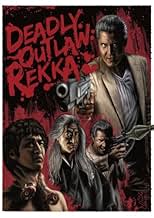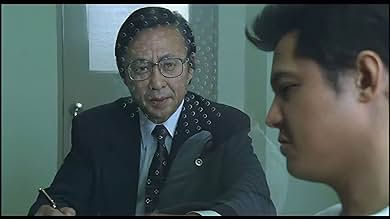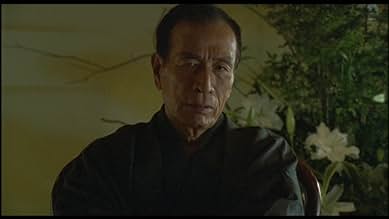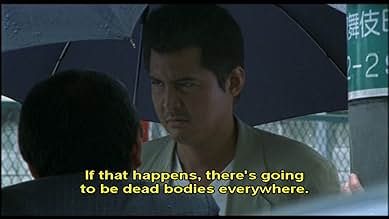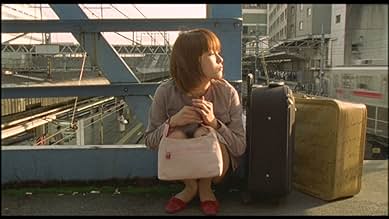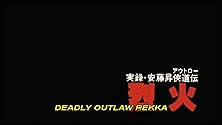Jitsuroku Andô Noboru kyôdô-den: Rekka
- 2002
- 1h 36min
VALUTAZIONE IMDb
6,7/10
1773
LA TUA VALUTAZIONE
Aggiungi una trama nella tua linguaWhen his beloved boss is killed, a dangerous young gangster cuts a path of vengeance through the Japanese mafia.When his beloved boss is killed, a dangerous young gangster cuts a path of vengeance through the Japanese mafia.When his beloved boss is killed, a dangerous young gangster cuts a path of vengeance through the Japanese mafia.
- Regia
- Sceneggiatura
- Star
Recensioni in evidenza
Rekka is a movie that deals with the theme of backstabbing and diplomacy of the new Yakuza clashing against the violence and honor of the old Yakuza; a common theme in Miike's under-the-radar gangster movies. It begins when the protagonist's father, the leader of a crime family, is killed. Before he knows what's happening, the new boss of his gang is already making agreements and accepting the murder to avoid a full-scale gang war. Needless to say, the son isn't happy, so he seeks revenge on the rival crime family. Knowing this, the new boss tries to get rid of him so that he can enjoy his new place in the Yakuza hierarchy.
On its own, this is an exciting modern Yakuza thriller filled with bloodshed and intrigue. But if you're already a Miike fan, you might be let down by a few details.
Rekka follows a pretty distinct formula. It has the same plot ideas, nearly the same characters, some of the same actors, and the same filmmakers as Agitator and Kikoku (which came out later). While Miike changes up the style and feel of each one, it still looks like he made three different versions of the same movie. Shigenori Takechi, the screenwriter of all three, has to be the laziest guy in the film industry. You see the same characters doing the same things, only with different names and settings. Like the other movies, the protagonist is a seemingly invincible and honorable guy who just can't seem to get killed no matter what he does. There is a charismatic and equally invincible hit-man chasing him. There are greedy and cowardly superiors that only he can stand up to. There is a dethroned and deceased father figure that he wants to avenge. And of course, there is a love interest that appears for a few minutes combined and has no personality or reason to even be in this movie.
The way that this movie is different is that the feel is a little more intense and modern than the other two. The visuals and camera-work are comparatively better and do a much better job of grabbing your attention. It is not as slow-paced and complicated as Agitator (clearly the best of the three), and it's all-around better than Kikoku (the worst). The ending is the most unique part. For better or worse, it is incredibly strange, and I know that some people will like it. Rekka appears to have the largest budget of the three movie and is the easiest to understand; it's definitely the one to show to your friends.
Like those two other movies, there are no insane shocker moments or incredible gore effects that will stick in your head forever. Rekka has almost nothing in common with Ichi or Fudoh, for example, so new fans of Miike's work might not get what they expect. But it has more than its share of violence, just not enough to make your head spin.
On it's own, Rekka is definitely not a waste of time, and my criticism doesn't sound fair at all. However, the feeling is ruined when you've seen Agitator and/or Kikoku. Seeing these movies after each other in a short span of time left me with a feeling that I got from Graveyard of Honor, another Miike/Takechi product. But in that case, it only took one movie to make me feel uncomfortable by giving me the same message over and over again.
On its own, this is an exciting modern Yakuza thriller filled with bloodshed and intrigue. But if you're already a Miike fan, you might be let down by a few details.
Rekka follows a pretty distinct formula. It has the same plot ideas, nearly the same characters, some of the same actors, and the same filmmakers as Agitator and Kikoku (which came out later). While Miike changes up the style and feel of each one, it still looks like he made three different versions of the same movie. Shigenori Takechi, the screenwriter of all three, has to be the laziest guy in the film industry. You see the same characters doing the same things, only with different names and settings. Like the other movies, the protagonist is a seemingly invincible and honorable guy who just can't seem to get killed no matter what he does. There is a charismatic and equally invincible hit-man chasing him. There are greedy and cowardly superiors that only he can stand up to. There is a dethroned and deceased father figure that he wants to avenge. And of course, there is a love interest that appears for a few minutes combined and has no personality or reason to even be in this movie.
The way that this movie is different is that the feel is a little more intense and modern than the other two. The visuals and camera-work are comparatively better and do a much better job of grabbing your attention. It is not as slow-paced and complicated as Agitator (clearly the best of the three), and it's all-around better than Kikoku (the worst). The ending is the most unique part. For better or worse, it is incredibly strange, and I know that some people will like it. Rekka appears to have the largest budget of the three movie and is the easiest to understand; it's definitely the one to show to your friends.
Like those two other movies, there are no insane shocker moments or incredible gore effects that will stick in your head forever. Rekka has almost nothing in common with Ichi or Fudoh, for example, so new fans of Miike's work might not get what they expect. But it has more than its share of violence, just not enough to make your head spin.
On it's own, Rekka is definitely not a waste of time, and my criticism doesn't sound fair at all. However, the feeling is ruined when you've seen Agitator and/or Kikoku. Seeing these movies after each other in a short span of time left me with a feeling that I got from Graveyard of Honor, another Miike/Takechi product. But in that case, it only took one movie to make me feel uncomfortable by giving me the same message over and over again.
DEADLY OUTLAW: REKKA is a rare misfire from the usually interesting Takashi Miike, who can typically be relied upon from making outrageously entertaining movies. This is a standard Yakuza movie, featuring a low rent thug who decides to go on an odyssey of revenge, yet despite a few moments of surrealism and violence you can't really tell it's a Miike film at all.
Instead it has more in common with low budget art-house fare, featuring interchangeable characters and some padded scenes of characters wandering the streets aimlessly at night. Oh, there's bound to be a brutal fight scene or execution around the next corner, but there isn't anything that makes you care about what's going on. Okay, I don't watch a Miike film for the characterisation, but at least ICHI THE KILLER had tons of incident and AUDITION's slow build worked when matched with THAT ending.
This one's predictable in the extreme, I couldn't care less about the characters, and the whole 'stone face' type of acting is just a bit dull. Miike tries to spice things up with a sex scene here and a mutilation there, but it isn't enough; for much of the running time, I was simply bored. DEADLY OUTLAW: REKKA does have the same kind of hustle and vibe as the early gangster films of Beat Takeshi, but it lacks their finesse and raw power. Attempts to make it feel like an old-fashioned grindhouse movie of the 1970s don't really gel either; instead this movie is both slight and forgettable.
Instead it has more in common with low budget art-house fare, featuring interchangeable characters and some padded scenes of characters wandering the streets aimlessly at night. Oh, there's bound to be a brutal fight scene or execution around the next corner, but there isn't anything that makes you care about what's going on. Okay, I don't watch a Miike film for the characterisation, but at least ICHI THE KILLER had tons of incident and AUDITION's slow build worked when matched with THAT ending.
This one's predictable in the extreme, I couldn't care less about the characters, and the whole 'stone face' type of acting is just a bit dull. Miike tries to spice things up with a sex scene here and a mutilation there, but it isn't enough; for much of the running time, I was simply bored. DEADLY OUTLAW: REKKA does have the same kind of hustle and vibe as the early gangster films of Beat Takeshi, but it lacks their finesse and raw power. Attempts to make it feel like an old-fashioned grindhouse movie of the 1970s don't really gel either; instead this movie is both slight and forgettable.
Assassins from the Otaki group murder Yuya Uchida (manager/producer of 1970's psychedelic prog metal band Flower Travellin' Band, who provide the film's soundtrack) leader of the Sanada group. Riki Takeuchi considered him a father figure and wants vengeance, but the leaders of both groups want to avoid a war and enlist Bando group leader Sonny Chiba to negotiate a truce.
So ... it's all a scheme by both groups second-in-commands to eliminate the leaders and take over, with Chiba running the whole show. They trick Takeuchi into killing Otaki group leader Renji Ishibashi and then try to kill him to close all loose ends. Those loose ends stay very much open.
Takashi Miike has a tendency to make films that are so loose and ramshackle that they feel like they may fall apart at any minute. This is one of those. That doesn't mean they're necessarily bad ... and this one certainly isn't ... but it does mean that after a really dynamic opening and before it's amazing gonzo conclusion, you get a lot of meandering scenes of yakuza dumping plot exposition on each other. It's not always dull ... mainly due to Miike's tendency to stage very weird scenes like two yakuza talking outdoors in a playground in the rain each holding tiny transparent plastic umbrellas ... but it frequently is.
The Flower Travellin' Band soundtrack is worth the price of admission.
So ... it's all a scheme by both groups second-in-commands to eliminate the leaders and take over, with Chiba running the whole show. They trick Takeuchi into killing Otaki group leader Renji Ishibashi and then try to kill him to close all loose ends. Those loose ends stay very much open.
Takashi Miike has a tendency to make films that are so loose and ramshackle that they feel like they may fall apart at any minute. This is one of those. That doesn't mean they're necessarily bad ... and this one certainly isn't ... but it does mean that after a really dynamic opening and before it's amazing gonzo conclusion, you get a lot of meandering scenes of yakuza dumping plot exposition on each other. It's not always dull ... mainly due to Miike's tendency to stage very weird scenes like two yakuza talking outdoors in a playground in the rain each holding tiny transparent plastic umbrellas ... but it frequently is.
The Flower Travellin' Band soundtrack is worth the price of admission.
This was really one great ride from Takashi Miike, if you love or you are familliar with his style you will really enjoy Deadly Outlaw:Rekka, it is not intelligent movie, it is not movie with a big budget but it is entertraining and full of energy, and yes the cast in this one is amazing, so many great memorable faces from Japanese cinema, sadly a lot of them are now deceased: Joe Yamanaka, Rikiya Yasuoka, Yuya Uchida, Tetsuro Tanba, Shin'ichi Chiba and the main protagonist of the movie Riki Takeuchi, this is one of his most memorable roles for sure. The first half of the movie is like any other regular Yakuza movie, the second part is more unique cartoonish Miike style, and it works in the movie very well, love the ending when Riki is taking Bazooka to destroy his enemies. You will remember this movie thanks to magnificent cast and its charachters, i enjoyed this one more than more known Dead or Alive. In the same day i have watched Kikoku or Yakuza Demon from 2003, it is different sort of the movie, more regular Yakuza crime, but my recoomendation is to watch it in combination with Deadly Outlaw Rekka. I give this one 8/10.
10ele129
Like many people I was first turned onto the works of the great director Takashi Miike in the movie "Ichi the killer". After viewing that film I was instantly hooked to his take no prisoners style. Takashi Miike is a man that truly stretches the boundaries of violence and audacity into an art form. Several months later I was surprised to see "Deadly Outlaw Rekka" sitting on the shelves of my local Best Buy. Due to the rarity of Takashi Miike's films I bought it without hesitation, and I'm glad I did. Japanese film star Riki Takuechi (or as i like to call him, cool hair guy from "Dead or Alive") plays the roll of Kunisada, a grizzly yakuza hell bent on revenge for the death of his boss. As the story unfolds the audience becomes ensnared in webs of love, betrayal, sorrow, and revenge. Though lacking in the unbridled violence that originally drew me in to these kind of movies the gritty and often times zany style of Takashi Miike remains ever present. Overall "Deadly Outlaw Rekka" is a fantastic film that is a must have for fans of Takashi Miike or just really great action films and worthy addition to any movie collection!
Lo sapevi?
- QuizTakashi Miike cut this movie to the strains of the 1971 progressive rock album "Satori" by the Flower Traveling Band, which he learned of through costars Joe Yamanaka and Yûya Uchida, who were also the band's founding members. Miike found the album to be way ahead of its time and was delighted at how well and inconspicuously it cut into a movie made 30 years later.
- BlooperAt 35:52 the shadow of someone holding a hand-held camera can be seen.
- ConnessioniReferenced in Rewind This! (2013)
I più visti
Accedi per valutare e creare un elenco di titoli salvati per ottenere consigli personalizzati
Dettagli
- Data di uscita
- Paese di origine
- Sito ufficiale
- Lingua
- Celebre anche come
- Deadly Outlaw: Rekka
- Azienda produttrice
- Vedi altri crediti dell’azienda su IMDbPro
- Tempo di esecuzione
- 1h 36min(96 min)
- Colore
Contribuisci a questa pagina
Suggerisci una modifica o aggiungi i contenuti mancanti

